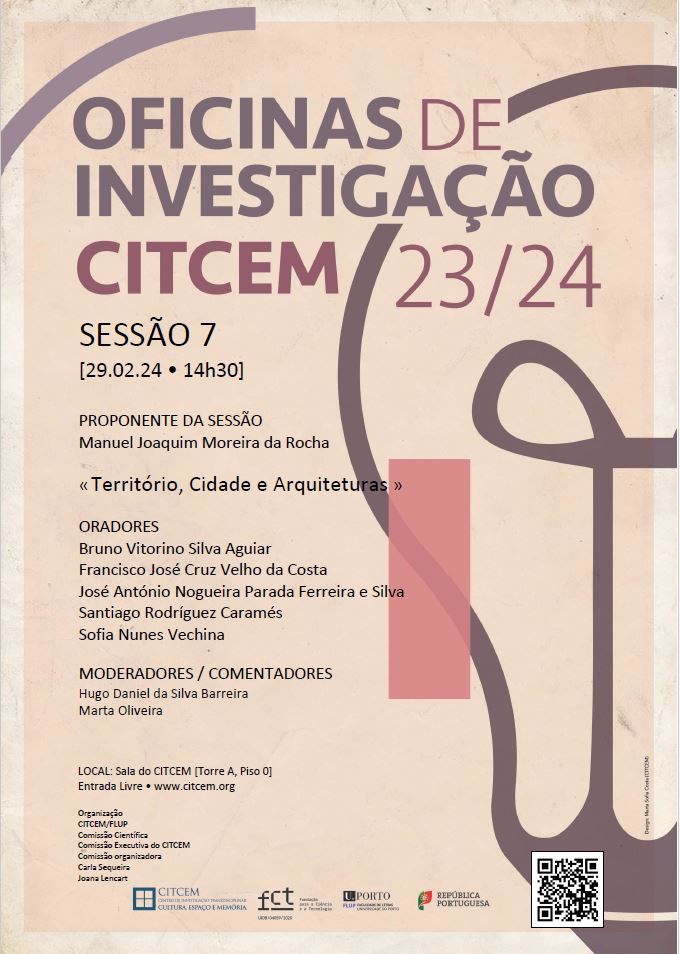News
7th SESSION OIC 2023/24 "Territory, City and Architectures"
February 29th | 2:30pm | CITCEM Auditorium (FLUP)
Session leader: Manuel Joaquim Moreira da Rocha (Associate Professor at the Faculty of Arts and Humanities of the University of Porto. CITCEM Research Group: Material and Intangible Heritage. Science ID: 4719-0819-54CE. Orcid: 0000-0002-5390-8587)
Title/General theme of the session: “Territory, City and Architectures”
Session Summary: The intrinsic relationship between territory and way of doing things conditions the most diverse aspects of human culture. The city, as a visible (and invisible) configuration of a territory that can be defined by various characteristics (geomorphological, demographic, social, economic, artistic, etc.), establishes a set of deep cultural relationships with it over time and space, acting as one of the privileged stages for the perception of heritage legacies of a material and immaterial nature. The genius loci can thus be characterized by, among other things, a complex web of interactions between natural conditions and anthropic actions, which in diachronic transversality and in movements of a centripetal or centrifugal nature, configure diverse landscapes. In this session, five research studies resulting from master’s and doctoral projects in the field of heritage studies focus on many of these aspects. From the quarry to the working of materials, starting with the raw material and reflecting on its visible dimension in architectures made of noble materials, or in their imitations through coatings, in an inseparable relationship between territory and the way of thinking, doing or transmitting values through the built fabric. From the ancient human networks, structures and physical paths for the extraction and circulation of materials, from the old settlements that retain in their toponymy or in their landscape the geomorphological accidents that dictated their role in the history of architecture, we move on to the problems of the present, through reflection on the third landscape and on a set of spaces that the current city integrates in different ways. From the unshakeable confidence of the industrial city, which imposed its reticules on suburbs and coastal areas, in an organization adaptable to the easy transaction of real estate and furniture, in which work or leisure spaces were erected, in an expansion of the standardized city of modern materials, historical urban landscapes were born which, in the current debate on sustainability seen in a holistic way, reconfigure spaces and memories in new logics of occupation and valorization of urbanity and peri-urbanity. Similar concerns are guiding the recovery of ancestral techniques, once again focused on the territory and its substrate, while the dream of utopian modernism seemed to fall into the role of acronic plans and cities made of dreams and ideas that, from a crypto-historical-artistic perspective, teach us as much about the past as they do about the present and the future.
Name of the speakers and their paper titles:
Bruno Vitorino Silva Aguiar (PhD candidate in Heritage Studies – History of Art at FLUP, researcher at CITCEM. Science ID 8919-9D2B-A4DB) – A backwater for a city in transformation: the domestic architecture of Recife’s big bourgeoisie in Manquinho between the 19th and 20th centuries
Francisco José Cruz Velho da Costa (PhD student in Heritage Studies – History of Art at FLUP) – Records of transition in an expanding territory: The case of Matosinhos-Sul – Methodological approach to the transformations of urban space through the architectures of industrial memory
José António Nogueira Parada Ferreira e Silva (PhD student in Heritage Studies – History of Art at FLUP. Head of the MMIPO’s Studies and Research Department) – From extraction to mining. The importance of quarry selection in architectural design
Santiago Rodríguez Caramés (PhD in Art History from the Faculty of Santiago de Compostela. Orcid: 0000-0002-4579-0558) – Counterfactual cities, dreamed architectures: the question of unrealized architecture in Galicia. A contemporary approach (1970-2010)
Sofia Nunes Vechina (PhD in Art History from FLUP. Orcid: 0000-0002-4642-1615) – Earthen buildings in the Aveiro region between the 19th and 20th centuries
Moderators-commentators of the session:
Hugo Daniel da Silva Barreira (Associate Professor at the Faculty of Letters of the University of Porto. Orcid: 0000-0002-7396-0913. Science ID: FF10-DA93-F24F).
Marta Oliveira (Retired Professor at the Faculty of Architecture of the University of Porto. Science ID: 6B13-FA1A-9BDC).
Free Entry!
Webpage ICO: : https://oficinascitcem.wixsite.com/oiccitcem

